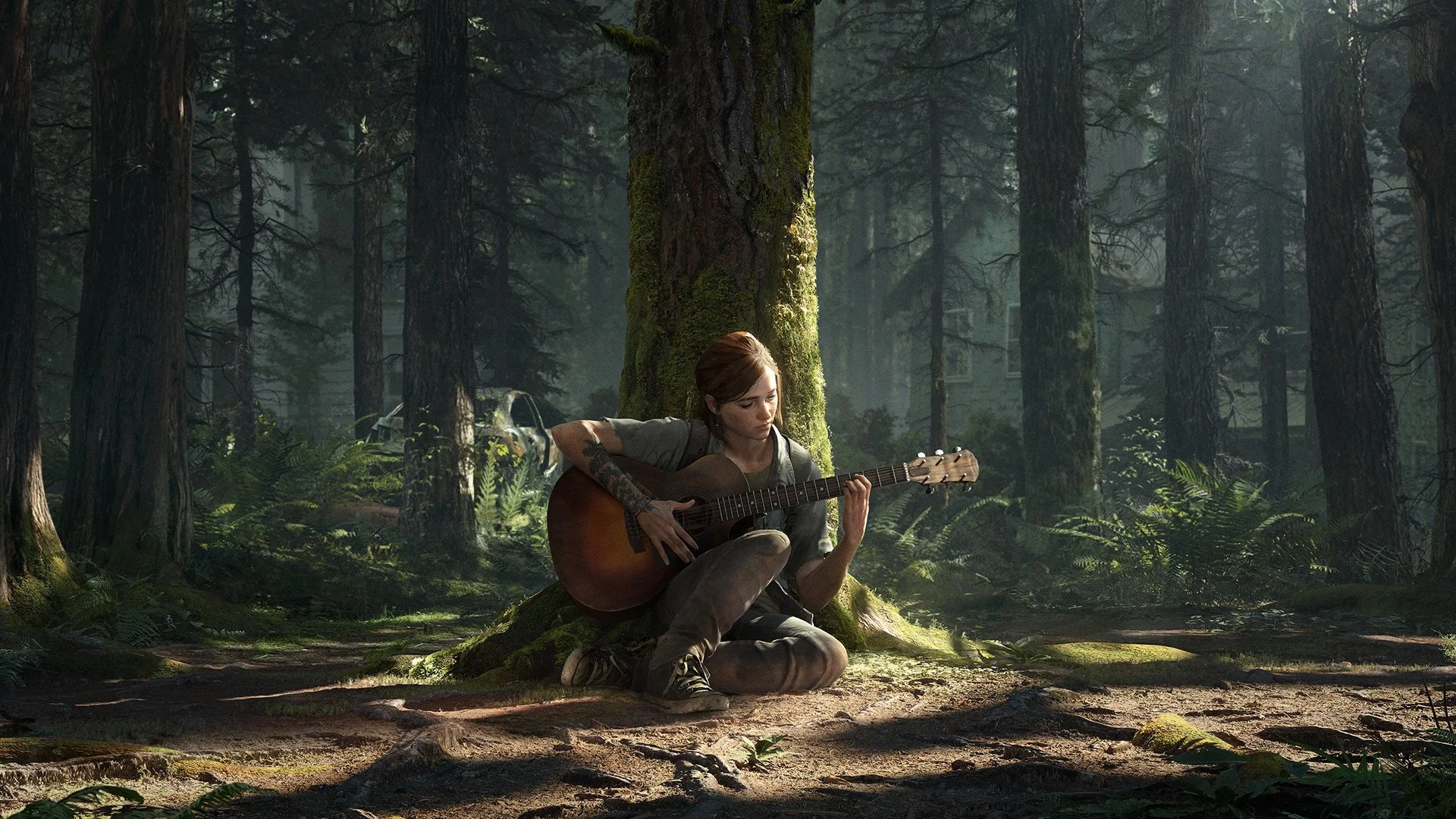A Better Us
Spoilers, don't upset yourself.
"You don't get to hate it unless you love it."
- Jimmy Fails
I loved The Last of Us 2.
I also hated TLOU2. Because TLOU2 failed narratively.
Let me be clear, this isn't an addition to the cacophony of bigoted, transphobic, misogynistic, prejudice that the internet hordes slung at this title. This is a constructive critique, offering suggestions that would have unified play and theme in order to fulfill the stated dramatic arguments of the creators.
This is a hypothetical re-working of a game that has already been meticulously crafted.
Many have said TLOU2 "is so much more than a game". And true, it soared to such stellar, genre defining heights as an experience, but still crashed into reductive pits of basic, tired bullshit in its story and its mechanics. So I began to think - "if I was on the development team, what elements would I have added, thematically and mechanically, in order for this title to ring true as a "masterpiece"?
As well as: How would I challenge the hollow diversity of Naughty Dog and fix the continual relegation of melenated characters from solely being backboards for the white leads' growth?
Choice & Agency. That's how.
Ellie takes a soothing break from murder to play Wonderwall by Oasis.
Director Neil Druckmann has explicitly stated the thesis of TLOU II in interviews, stating:
"We say it's a game about hate, but that's not true. It's a game about empathy. It's a game about forgiveness."
Nah brother. Didn't get that.
At no point during those thirty some odd hours did I find myself saying it was a game about forgiveness, and certainly not after I walked away. Exhaustion maybe, the entropy of vengeance perhaps, but certainly not empathy.
But don't fret my stoic, cynical, Brooklyn Barista hair-do friend. I come to you today as if I am one of your exhausted, crunch-affected team members. Bursting with unsolicited ideas.
Smh…
CHOICE
I walked away and stared at my controller for fifteen minutes when the game prompted me to do what I desperately did not want to do. What I could not do.
Bash in this Black woman's skull.
So I refused. And the blinking white, elegant square patiently waited for a decision that had already been made. Carved into digital stone by hands that we're not mine. And in order to progress through the story, I relented to the predestined binary brutality. But nowhere in that button press, was my actual choice considered in the action.
Empathy requires choice.
TLOU2 fails to give us that option. Empathy requires an unlearning of narcissistic, violent self-preservation. There was a potential for this to be shown through accumulating tools for conflict resolution in-game. But neither character advances in their ability to interact within the world in an empathic way. They, and therefore we only persist in our brutality. We stay the same.
And yet, the game almost perfectly established a canvas to implement gameplay elements and specific branching story choices. The potential is there.
Empathy requires choice in the dilemma.
Give Ellie, and therefore us, the player, what Joel never had: the ability to select mercy.
I see this theme playing out in two different ways between Ellie and Abby. Whereas Abby starts out the story in a place of being consumed by rage and vengeance, and then grows away from it, Ellie has the diametrically opposed arc. The gameplay model through upgrade trees, binary major cinematic choices, etc. would all match the characters’ trajectories, and therefore reinforce the narrative construction.
With Ellie, the upgrade system would stay the same, her lethality matching the brutal chase for revenge. But in order to see an actual dynamic of change in her, give the player a different outcome than what we were given with the first game. Rather than retreading the path, allow us the opportunity to not repeat the sins of the father. We didn't have a choice when we barged in and killed the doctor, and I remember not batting an eye at the bloodshed, as I felt completely merged with the ludonarrative momentum.
Goal and action interlaced as we killed the one chance for humanity's salvation in order to save this child that we love.
But here we are, seven years and thirty some hours later, and we’re being pummeled with a scolding similar to a dog's face being shoved in its piss on the kitchen carpet: "Look at the mess you've made." Here are the consequences of the violence you participated in, the game seems to say.
So let this finale of TLOU2 be an evolution sprung from the ashes of that moment, and when Ellie is at the boats with Abby - rather than slicing her to oblivion until a Deus Ex Machina flashback interrupts her one-note death tirade - let us reflect on the senselessness of this violence as a player. Give us the physical choice of square to keep fighting, or circle to fucking finally hang this pointless crusade up. Allowing her, and us, the opportunity to heal. To show benevolence through choice.
Meanwhile with Abby, implement a leveling system that reinforces her developing empathy. Unlock the ability to KO, not just kill enemies. Craft non lethal ranged weapons. Give true Metal Gear Solid level stealth by making there be a cost to non-lethality. Something that ratchets up the tension by requiring more effort and focus in the midst of battle by having to not choose the quick option of killing. Mirror the difficulty of being empathetic in this world by having it actually be technically difficult to pull off. Use the pressure sensitive triggers as a modifier so that you must be gentle with your touch, or a measured tapping of the face buttons a'la MGS to choke out enemies and spare them. Let us see that Abby is learning empathy in gameplay as well as in the cinematics.
Through this implementation we will find empathy not only within the characters, but within the audience. Now, at our climax when the characters confront each other with two opposing end goals, we've been complicit in their growth and are invested in them each making a decision that is righteous. Suddenly we are in a unique, challenging position. Rooting for both Ellie and Abby to do the right thing. Rather than just screaming at our televisions for Ellie to actually have some dimensionality past psychopathy and to make a choice that illustrates that in the past thirty hours of gameplay that she’s actually learned something.
AGENCY
Marlene. Riley. Isaac. Sam. Nora. Lev.
The leader of the Fireflies. Ellie's first love interest. The boss of the WLF. All the surface level importance that is designated to characters of color is always undermined by their complete lack of agency within the stories. They are defined by their proximity to the white protagonists and their specific pains, passions, or cultural experiences are never explored unless they become appropriated traumas for our white leads to then save them from. For Nora, her skull functioned as a prop for Ellie to smash to pieces in order for Ellie to be traumatized. For Abby, well… Lev is everything.
In fact - the only moment of empathy in the conflict did not come from any internal realization within Abby or Ellie.
When Abby was about to murder the pregnant Dina, she was not stopped by a her own will or compassion, but from a reaction of horror from Lev. And so continuously, we watch these white characters rampage through a world populated by supporting characters of color who either are appropriated for the white characters' growth, like sherpas for their emotional arcs, or just function as expository pawns forwarding of the plot. (*cough* hello Uncharted *cough*) Although it seems progressive on the surface, Naughty Dog's use of POC characters just simply relegates them to simple pawns on the chessboard.
And don’t even get me started with this…
Let us critique the stories we love, in order to make them better.
In order for them to be harmonious with the vision that they set out to accomplish.
In order for marginalized people to not persist as partial, marginal characters.
In order for us to truly tell stories of empathy.





